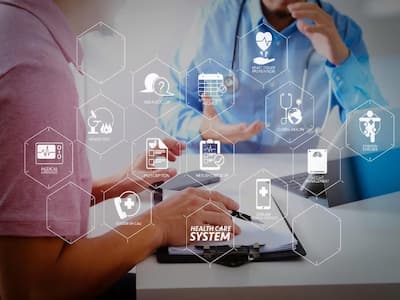
The era of cognitive healthcare has dawned, and its potential to revolutionize medical services and patient outcomes is boundless.
Efficient digital content management in the health industry is critical for the flawless execution of the provided healthcare services. The increase in life expectancy and recent advancements in technology have changed the way we look at the healthcare industry as the healthcare industry stands on the brink of a transformative revolution. There are some key factors driving the increasing adoption of integration cutting-edge technologies such as AI & the Internet of Things (IoT) which are reshaping the landscape of healthcare, offering personalized care, remote monitoring, and surgical precision like never before. Healthcare in the digital era is experimenting with adopting robotics to provide personal healthcare to patients in need. This technology enabled the healthcare industry to manage patients properly by adopting interconnected networks.
Personalized and Predictive Care
Personalized healthcare is a new and strategic approach that is driven by personalized health planning empowered by personalized medicine tools which are facilitated by advances in science & technology. Imagine a healthcare system that doesn’t just react to illnesses but predicts and prevents them. Personalized and predictive care improve the capability of predictive health risk to determine and quantify the dynamics of disease development and to target therapeutic approaches to the needs of the individual. Personalized healthcare is possible by the symbiotic relationship between AI and IoT. By continuously monitoring patient data from wearable’s and other medical devices, healthcare providers can employ predictive algorithms to identify potential health issues before they escalate. Recent data reveals that these algorithms have exhibited remarkable accuracy in detecting early signs of conditions such as heart disease, diabetes, and even mental health disorders. Such proactive intervention not only leads to tailored treatment plans but also translates into improved patient outcomes and reduced healthcare costs.
Remote Monitoring and Telemedicine
Telemedicine & remote monitoring represent far more than the communication of health data via a ‘remote connection. Digitized telemedicine tools with the IoT started advancing into our daily lives and have been incorporated with commercial wearable gadgets for noninvasive remote health monitoring. Remote monitoring of vital signs, powered by wearable devices connected to the IoT, allows healthcare providers to track patients’ health status in real time. This capability is especially significant for patients residing in remote or underserved areas who previously faced challenges in accessing specialized medical care. Recent data shows that telemedicine adoption has surged by 65% in the past two years alone, emphasizing its growing importance in the healthcare ecosystem.
Furthermore, the integration of AI-driven virtual healthcare assistants is revolutionizing the way patients interact with medical professionals. These AI-powered assistants provide immediate responses to queries, offer medication reminders, and even assist in diagnosing common ailments. Studies indicate that over 80% of patients find virtual assistants helpful in managing their health, showcasing the potential of AI-driven support systems in enhancing patient engagement and adherence to treatment plans.
Robotic Assistance in Surgery and Patient Care
Robotics has been coming into the spotlight in the field of medicine. Robots have the capabilities to assist while performing highly complicated tasks like treatments of cancers and surgeries, and also, with robotics assistance, patients can recover even faster & with fewer complications. Precision is the cornerstone of successful medical procedures, and AI-equipped robotic systems are emerging as valuable tools for achieving surgical excellence with robotics assistance in surgery. Smaller incisions, often the size of a dime, can mean less pain compared to open surgery, A quicker recovery, and less time spent in the hospital because of the small incisions and less disturbance inside the body, and Better vision for surgeons through the use of a 3D camera which gives them a view ten times better than the human eye.
READ RELATED: What Happens To Your Body If You Don’t Eat Wheat For A Month?
In Conclusion
The future of cognitive healthcare is not just a vision but a rapidly unfolding reality. The convergence of AI, IoT, and robotics is propelling healthcare into uncharted territory, where personalized care, remote access, and surgical precision are becoming the new norm. As recent data and numbers demonstrate, the integration of these technologies is already yielding remarkable results, promising a brighter and healthier future for individuals across the globe. The era of cognitive healthcare has dawned, and its potential to revolutionize medical services and patient outcomes is boundless.
The article is contributed by Rama Krishna Sreepada (Co-founder and Chief Architect, [x]cube LABS.
Total Wellness is now just a click away.
Follow us on
Don’t Miss Out on the Latest Updates.
Subscribe to Our Newsletter Today!
window.addEventListener(‘load’, (event) => {
$(‘#commentbtn’).on(“click”,function(){
(function(d, s, id) { var js, fjs = d.getElementsByTagName(s)[0]; if (d.getElementById(id)) return; js = d.createElement(s); js.id = id; js.src = “//connect.facebook.net/en_US/sdk.js#xfbml=1&version=v2.3”; fjs.parentNode.insertBefore(js, fjs);}(document, ‘script’, ‘facebook-jssdk’));
$(“.cmntbox”).toggle();
});
});







